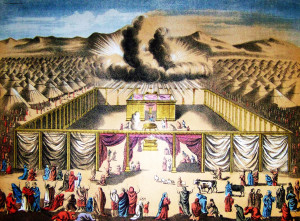
For the Israelites, a multitude of former slaves, coming out of Egypt was a time in which they had to transform themselves into a unified, covenantal and ethical community. No single act on the journey sealed the deal of becoming a collective with common ties, not the dramatic exodus from Egypt, nor the miraculous parting of the sea, not even receiving the Ten Commandments; yet each act provided a necessary layer for the process of becoming unified.
Last week’s Torah reading Exodus 21-24 offered a signature act in community making as the Israelites entered a covenantal relationship with God and said in one voice “we will do.” In that historic moment the people affirmed their relationship with God and agreed to be an ethical community, to follow a set of rules and laws that would structure their personal and collective life. A critical element in becoming an ethical community was the reminder to the Israelites that they were strangers in the land of Egypt and that obligated them forever to treat with fairness and compassion the stranger, the orphan, the widow and by extension the marginalized, refugees, undocumented migrants, people with disabilities and all those who are victimized and powerless.
At first glance this week’s Torah reading Exodus 25-30 does not seem to fit into a narrative of forging an ethical community. The Parsha offers a detailed architectural blueprint for building the Tabernacle, Mishkan, with instructions for the materials to be used, the furniture it will contain and the exact measurements of every sacred object, paying attention to the smallest detail of how to connect the parts and hold them together, “the rings shall be next to the rim as holders for poles to carry the table.”
Yet, the detailed instructions of building the Tabernacle are the materiality of the building of an ethical community. One key detail here is God’s call to the Israelites to make charitable gifts to build the Tabernacle; each is asked to give according to their ability as a foundation to an ethics of giving that makes community. Parshat Trumah opens with a call for gift giving, “God spoke to Moses, saying: Tell the Israelite people to bring me gifts, trumah, you shall accept gifts for me from every person whose heart so moves him.”
The call to give charitable gifts for the Tabernacle was not to pay a tax, a levy or any required or specified amount. Each gift would forge two sets of relations the first would clearly be with God and the second with all other contributors. The gifts have different material values since each would give as much as they could afford. No one however would know how much the rest would give and it would not matter; the people essentially gave to each other the materials to build the Tabernacle and together became the receivers since the space of the Tabernacle belonged to all, “and let them make me a sanctuary that I may dwell among them.” God’s dwelling is not “in it,” but is “among” the people whose charitable gifts “of the heart” make the Tabernacle the people’s place. God dwells wherever people come together to create a communal sanctuary in which each charitable gift small or large has equal value. Each Israelite’s gift does not glorify the giver, not does it stand alone; it becomes part of the sanctuary. When we think of making a charitable gift, a truma, yet worry about the amount we can afford let us recall that in the building of Tabernacle, Mishkan, even a smallest donation has equal value to make it a place where God dwells among the people.
Here is a Blessing to Recite Upon Giving a Charitable Gift that draws on Deuteronomy 26:
“My forefather was a fugitive Aramean. He went down to Egypt and there became a large nation. The Egyptians have enslaved us. God freed us by a mighty hand. Now I am bringing the first fruit of the land that You, God gave me. I am sharing my harvest with the Levite, the stranger, the orphan and the widow as you have told me to me to do. May my charitable gift be of blessing.”